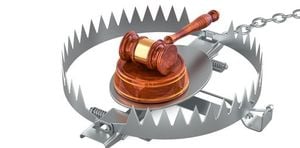Feral donkeys, often seen as pests, have taken center stage at Kachana Station, where land manager Chris Henggeler is leading a radical experiment to regenerate the land using these misunderstood animals. Located 120 kilometers southwest of Kununurra, Western Australia, Kachana Station has transformed from scorched earth to vibrant landscapes, largely due to the influence of wild donkeys, which Henggeler believes could play a pivotal role in managing bushfires and restoring ecological balance.
Despite the West Australian government's insistence on eradicatiing feral donkeys, Henggeler stands firmly against what he considers misguided culling efforts. He passionately states, "If the science is not on my side, I deserve to be locked up. And if the science is on my side, I deserve an apology." His words echo the depth of his commitment to this controversial ecological experiment.
Henggeler’s ties to Kachana run deep. He first arrived on the land 30 years ago, captivated by its rustic beauty and wide horizons. With no access roads, the only way to travel to Kachana is by air, making it even more remote. Initially, he envisioned starting afresh with his wife, Jacquie, during their early days of setting up the property, completely unaware of the land's dire condition at the time.
The couple's trek to build their dream slowly morphed from pastoral aspirations to land regeneration efforts as symptoms of land degradation became increasingly apparent. Withering heat and severe dust storms rocked their new home, foreshadowing the challenges to come. Yet, Henggeler's resolve only grew stronger as he watched landscapes undergo rapid desertification. He realized the solution wasn’t simply reducing herd numbers, as removing cattle worsened the land’s health.
Henggeler adopted what's known as holistic planned grazing — this strategy reimagines the roles of cattle as ecological caretakers rather than just livestock. He believes the grazing practices should mimic the natural behaviors of herding animals, and suggests integrating feral donkeys, which can navigate terrains inaccessible to cattle. This unorthodox approach focuses on diversifying livestock populations to revitalize the land and is seen by Henggeler as the key to healing the environment.
Under Henggeler’s careful management, areas of Kachana where donkeys are allowed to graze have shown remarkable improvements. Healthy soil has replaced desolated ground, with lush grasses and perennial creeks flourishing where once there was desolation. Henggeler's work has earned him the title of soil champion for the Kimberley region, showing how his unyielding belief in the donkeys’ ecological value is beginning to earn recognition.
The contentious perspective around feral donkeys stems largely from their historical roots as pack animals introduced to Australia during the Gold Rush. Now considered feral pests, these animals are often implicated in the erosion of native vegetation and the degradation of fragile ecosystems. Over 570,000 donkeys have been culled from the Kimberley alone over the past four decades, with conservationists likening them to other invasive species like cane toads and feral horses. Tim White, chief operations officer for Australian Wildlife Conservancy, points to the harm donkeys inflict, stating, "We think of donkeys in line with lantana or cane toads, feral horses. And we think they should be removed from the ecosystem," reflecting the prevailing viewpoint among traditional conservationists.
Yet, remains the question of whether this long-standing perception needs re-evaluation. Chris Henggeler argues passionately for the donkeys’ rehabilitation as environmental allies, rather than enemies. "We have Australia's new megafauna, and they could be put to work," he asserts, believing the benefits far outweigh the potential drawbacks. Just over the horizon, the looming threat of legal action against him weighs heavy as the state continues its push to cull the feral donkeys.
Despite the legal pressures, Henggeler remains undeterred. He recalls how the kill order struck him deeply, likening the experience to “a slap in the face.” To protect his regenerative effort, he is prepared to risk imprisonment rather than comply. He sheds light on the emotional toll it takes on his family, admitting, "Had I known the price my family would pay for my learning, I would not have embarked on this project," reflecting on the personal sacrifices involved.
A unique aspect of Henggeler and Jacquie's undertaking is how they've managed to create a lifestyle intertwined with conservation and land management. Initially seeking economic independence through pastoral ventures and tourism, they’ve transformed their intent to focus on ecological recovery and sustainability for future generations. They’ve adapted to the challenges of raising children on remote land. For Henggeler, true wealth lies not just in monetary terms, but in the richness of nature.
The Kachana Station's story is now one of resilience and transformation, echoing the complex relationships between human intervention and nature's healing processes. Henggeler’s vision of employing feral donkeys for land regeneration challenges conventional thought and signifies the potential for new ecological strategies. Visibly changed landscapes testify to what’s achievable if we embrace the unexpected resources around us, even those once labeled as nuisances.
Looking toward the future, Henggeler’s experiment puts at stake the reputations of the species misunderstood as feral pests. The question remains, could the feral donkey find its redemption amid efforts to regenerate the land? Or will it continue to be perceived as nothing more than a menace to Australia’s natural ecosystems? Time will tell, but at Kachana Station, the ambitious dream of converting perceived threats to ecological heroes is being played out, step by step, hoof by hoof.



